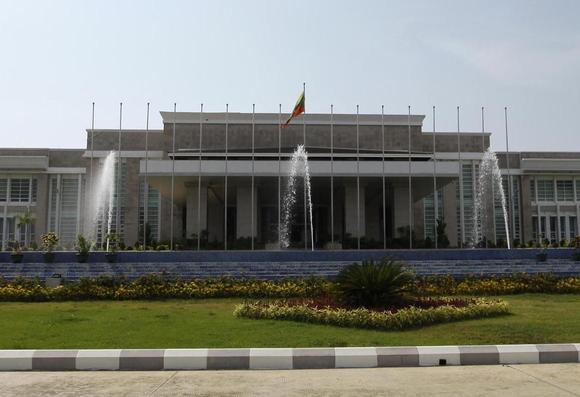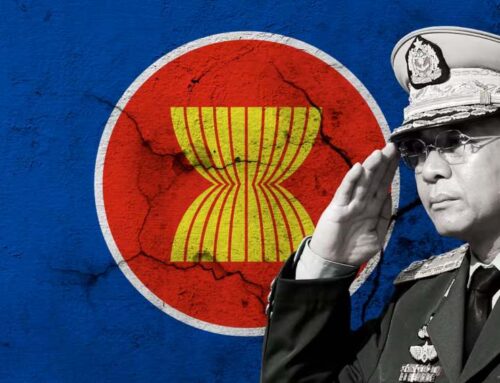StanChart’s surprise exit from Myanmar bank license process raises questions
{1st Photo Caption: Several international players have unexpectedly pulled out of Myanmar’s bank-licensing process, which is being overseen by the country’s central bank. © Reuters}
FINANCE
StanChart’s surprise exit from Myanmar bank license process raises questions
GWEN ROBINSON, senior Asia editor, Nikkei Asian Review
July 31, 2014 12:00 am JST
A last-minute decision by Standard Chartered Bank of the U.K. and a number of Asian banks to abandon plans to apply for the first wave of foreign branch licenses in Myanmar by the July 14 deadline has caught local officials off guard and raised questions among regional bankers about internal issues at StanChart.
StanChart is understood to have given little notice or explanation to the Myanmar government about its eleventh-hour decision. British government officials — who had been encouraging the bank’s efforts to enter Myanmar — also expressed surprise at the news.
Myanmar government officials, British diplomats and other Western bankers seemed bemused by StanChart’s decision, which runs contrary to the bank’s stated determination to re-enter Myanmar’s banking industry after opening a representative office there early last year. Foreign banks were forced out of the Southeast Asian country after Gen. Ne Win seized power in a 1962 coup. Since 1992, they have been permitted to open representative offices, which are unable to transact business in the country although they can assist foreign clients and liaise with the Myanmar government.
A StanChart spokesman issued a brief statement on July 17, saying: “We have decided that we will not apply for an onshore branch license at this time for commercial reasons.”
For the time being, he added, the bank will continue expanding its profile in Myanmar through its representative office.
StanChart specializes in emerging markets but has been under severe financial pressure lately. Among earlier difficulties, it ran afoul of international sanctions regimes, including those imposed on Myanmar, Libya, Iran and Sudan. The bank announced in late June that its first-half operating profit fell 20% on an annual basis from $4.1 billion and warned that overall operating profit would be down at least 10% for the full year due to pressure on currency and interest rate trading operations.
Despite such problems, StanChart continued to signal keen interest in entering Myanmar, which is rapidly opening up to Western investment after decades of military rule.
After opening its representative office in early 2013 in Yangon, StanChart became actively involved in assisting the central bank and finance officials with training and other forms of financial counsel. The U.K. government indicated last year its approval for StanChart’s return, and supported the British bank’s efforts to help develop Myanmar’s financial sector.
More than two-thirds of the 42 banks with foreign representative offices in Myanmar were originally expected to submit final applications for a banking license by the deadline of July 14, and the Central Bank of Myanmar has said it will announce up to 10 licenses by the end of September.
The process is being run by a German consultant, Roland Berger, on behalf of the government. Applicants were required to bring in a minimum of $75 million in capital for an initial sole branch — a requirement seen by many bank analysts as highly unusual for a branch license application. Initial sole branches will be restricted to corporate and wholesale banking, including underwriting trade finance.
Cooling interest
While at least 30 banks pre-qualified for licenses under the central bank criteria, only 25 banks applied — all of which had representative offices in Myanmar. These included Japan’s top three banks: Mitsubishi UFJ Financial Group, Mizuho Financial Group and Sumitomo Mitsui Financial Group. According to the central bank’s shortlist, others included the Australia and New Zealand Banking Group and key banks from countries in the 10-member Association of Southeast Asian Nations, China, India and South Korea.
However, both Woori Bank and Hana Bank of South Korea also decided against applying for licenses despite earlier indications of interest. Woori’s representative in Myanmar told The Myanmar Times that the bank “may get involved” in future opportunities to enter the market.
StanChart’s decision to abandon the process leaves ANZ as the only Western bank to follow through with an application. Asean banks, meanwhile, include Thailand’s Bangkok Bank and Siam Commercial Bank, Singapore’s United Overseas Bank and Malaysia’s CIMB Group Holdings. All have flagged their interest in setting up operations, said a Yangon-based financial consultant.
U.S. banks, meanwhile, remain wary of American sanctions that have been suspended but not removed.
Source Link: NIKKEI ASIAN REVIEW





